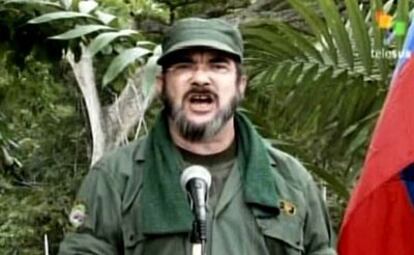Colombia focuses on Venezuela in hunt for FARC's new leader
"Timochenko" calls Santos "a bragger" and rules out surrender by rebels
Colombian President Juan Manuel Santos has asked his Venezuelan counterpart Hugo Chávez to determine whether the new leader of the Revolutionary Armed Forces of Colombia (FARC) is hiding out somewhere in Venezuela.
The Colombian government says it suspects that Rodrigo Londoño Echeverry, alias "Timochenko," has set up a base camp across the border.
Although he has no direct evidence as to Timochenko's whereabouts, Santos said on Monday that he has asked Chávez for his help through diplomatic channels. He explained that the request falls under the framework of an agreement he signed with Chávez soon after coming to office last year and under which rebels and paramilitaries who cross the border into Colombian territory must be arrested.
"Of course we have an agreement with President Chávez and if we come across any evidence that [the FARC leader] or any of his commanders are located there, we will give him the location so he can arrest them," Santos said.
Timochenko was elected last week by the FARC's secretariat following the death on November 5 by an army ambush of Guillermo León Sáenz, alias "Alfonso Cano." Santos has demanded that Timochenko give up and the FARC disband, but the new rebel leader has so far refused.
In a video communiqué issued on Monday, Timochenko called Santos "a big bragger."
"You cannot win anyone's sympathy by holding on to power and displaying a threatening and brutal attitude," he said, in a statement that was broadcast on Venezuela's Telesur network. "It cannot be that way, Santos, it cannot be that way."
Following Cano's death, the Colombian government had reiterated its call for the guerrillas to lay down their arms and demobilize.
Juan Carlos Pinzón, the Colombian defense minister, said Tuesday that at least 55 rebels have demobilized since Alfonso Cano's death. "This signifies that inside the organization there are people who are thinking things over, knowing that they cannot continue to live the life they are leading."
Officially established in 1962 as the military wing of the Colombian Communist Party, the FARC is the oldest guerrilla insurgency in Latin America.
"Surely they are going through some very difficult times," the minister added.
But Timochenko said that the "many desertions and betrayals" were not "a determining factor" as to whether the FARC will continue because "there are more and more revolutionaries who are convinced about this struggle."
No second term
Meanwhile, Santos told a meeting at the London School of Economics on Monday that he would prefer not to run for a second term if he is able to complete his goals. "Quite frankly, if I am able to achieve most of the objectives in four years, I would prefer to come here as a teacher at LSE," he said. Santos, who studied at LSE in the 1970s, said he had had "the best years of my life" in London.
Santos won the presidential election last year after his popular predecessor, Álvaro Uribe, was blocked by the Constitutional Court from seeking a third term. The country's Constitution had already been changed once in 2005 to allow Uribe to run for a second four-year term.

Tu suscripción se está usando en otro dispositivo
¿Quieres añadir otro usuario a tu suscripción?
Si continúas leyendo en este dispositivo, no se podrá leer en el otro.
FlechaTu suscripción se está usando en otro dispositivo y solo puedes acceder a EL PAÍS desde un dispositivo a la vez.
Si quieres compartir tu cuenta, cambia tu suscripción a la modalidad Premium, así podrás añadir otro usuario. Cada uno accederá con su propia cuenta de email, lo que os permitirá personalizar vuestra experiencia en EL PAÍS.
¿Tienes una suscripción de empresa? Accede aquí para contratar más cuentas.
En el caso de no saber quién está usando tu cuenta, te recomendamos cambiar tu contraseña aquí.
Si decides continuar compartiendo tu cuenta, este mensaje se mostrará en tu dispositivo y en el de la otra persona que está usando tu cuenta de forma indefinida, afectando a tu experiencia de lectura. Puedes consultar aquí los términos y condiciones de la suscripción digital.








































